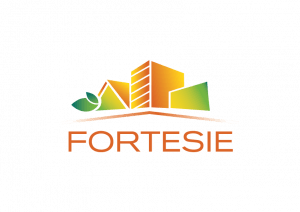
The built environment is responsible for a significant share of our consumption of energy and resources: 50% of all extracted materials, 30% of water consumption, 40% of energy consumption and 36% of CO2 emissions are associated with the building industry. The Renovation Wave set the objective to double the current renovation rate (at maximum 1% in EU1 ) by 2030.
FORTESIE vision departs from the realisation that achieving the green deal targets related to the built environment is complex and requires a multistakeholder approach, hence the Build4People partnership.
The overall vision of FORTESIE is to design, demonstrate, validate and replicate innovative renovation packages in the building industry with Smart Performance-Based guarantees and financing, aiming at Efficient, Sustainable and Inclusive Energy (ESIE) use to accelerate the Renovation Wave in Europe.
There will be 8 renovation demo projects realized in the FORTESIE project. The renovation packages will combine state-of-the-art construction materials and technologies components (prefabricated facades, BIPV, heat pumps, etc.), innovative digital technologies for measurement and verification, and attractive financing (e.g. contractual frameworks for smart performance guarantees, financing mechanisms, engagement techniques, green-euros, etc.), to raise the overall EPC value proposition.
The renovation packages will be tailored to specific target groups needs and optimised to improve the ESIE performance considering energy, CO2 and comfort.
Each package will be demonstrated and validated in real life use cases and customised for replication in all other partner countries for immediate market take-up.
Methodologies from Social Sciences and Humanities (SSH) will be adopted for:
- the creation of collaborative business models that boost the Renovation Wave by considering all stakeholders’ value and revenue streams,
- novel incentivisation and behavioural change models that aim to stimulate long term engagement with focused interactions to adopt green behaviour
- the incorporation of a digital currency, greeneuro, (€G) for financing, rewarding and creating an inclusive /collective narrative in the fight against climate change
- the collection of feedback for recommendations to policy and business stakeholders,
- Mapping and understanding the complex interplay between the different stakeholders to deliver an engagement strategy across the value chain.These demonstrations will potentially constitute the green-euro as a retail Central Bank Digital Currency (CBDC), hence revolutionising the financing of renovation approaches.
An online marketplace, will be offering first level advice, directing consumers through the value chain of stakeholders and facilitating access to these “packaged” renovation services.
- Digitisation and automation enablers for Measurement, Verification and funding: Smart green-euros contracts
- Integrated renovation packages solutions to raise the overall EPC value proposition
- Real demonstrators targeting several different stakeholders
3.1. Museum - improvement of building energy efficiency indicators (Greece);
3.2. Renovation projects of multi-apartment buildings. Three directions – building renovations, construction of innovative technologies, creation of one-stop agency (Spain and France);
3.3. Small-scale household building renovation projects (Portugal);
3.4. Building energy efficiency projects for housing management cooperatives (Portugal);
3.5. Improvement of energy efficiency indicators of Office buildings (Greece);
3.6. Improvement of office indoor air quality indicators (Greece);
3.7. Sustainable energy consumption in swimming pools (Poland);
3.8. Construction of school ventilation systems (Latvia).
- New business models for original and replicated packages serving, immediate market take up
- Boosting renovation wave with performance guarantees
Planned project budget 9 562 850 EUR. Latvian Environmental Investment Fund contributes to the Project as Project partner with amount 96 525 EUR.
Project lead partner:
- European dynamics Luxembourg SA (ED) - Luxeburg
Project partners:
- Ethnico metsovion polytechnion (NTUA) - Greece
- 450 (CCO2) - France
- Institute for european energy and climate policy stichting (IEECP) - Netherlad
- Smart innovation Norway AS – Norway
- Coopernico – cooperativa de desenvolvimento sustentavel CRL (COOP) – Portugal
- Gottfried wilhelm Leibniz universitatet Hannover (LUH) – Germany
- Fundacion ctic centro technologico para el desarrollo ne asturias de las technologias de la informacion (CTIC) – Spain
- VEOLIA servicios lecam sociedad aninima unipersonal (VEO) – Spain
- SENL Oktave (OKT) – France
- G. Techniki monoprosopi I.K.E. (TGT) – Greece
- Social open and inclusive innovation astiki mi kerdoskopiki etaireia (INCL) – Greece
- Fundacion agencia local de la energia del nalon enernalon (ENE) – Spain
- Construcciones garcia rama sl (GAR) – Spain
- +48 Architektura spolka cywilna karol szparkowski kamil miklaszewski (+ 48) - Polija
- Power parity S.A. (GOP) – Portugal
- Associacao Just a change (JUST) – Portugal
- Asociacia poskytovatelov energetickych sluzieb (APES) – Slovakia
- Energeticke centrum Bratislava (ECN) – Slovakia
- Cordia monoprosopu AE (CRD) – Greece
- Ministry of digital governance (GSIS) – Greece
- Etaireia gia ton ellinismo kai filellinismo amke (EEF) – Greece
- Dmina Gora Kalwareia (GKW) - Poland
Project partner from Latvia
- Latvijas Vides investīciju fonds (LVIF)
- SIA “MESH Energopārvaldība” (MESH)
- Ekonomikas Ministrija (DEE)
Aija Zučika
Project Manager
Tel.+37167845111
E-mail: aija.zucika@lvif.gov.lv

This project has received funding from the European Union’s Horizon 2020 research and innovation programme under grant agreement No 101080029
Latvian Environmental Investment Fund within the project has created an informative and educational video that gives insight, why the air quality in schools is essential and why it is important to focus on renovating ventilation systems and manage them according to the technical specification.
